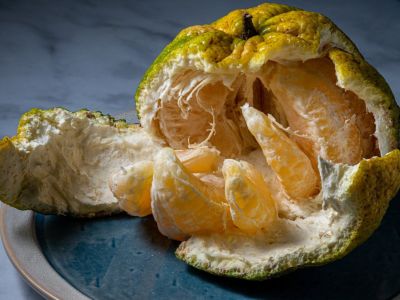The Ugli fruit tree originated in Jamaica. Citrus fruits are known to naturally hybridize, and such is the case with the Ugli fruit tree. How is Ugli fruit grown today? Plants are grafted to ensure the fruit remains true. Un-grafted plants might revert to another variety of citrus. The plants can only grow in frost free regions with plenty of sunshine.
What is Ugli Fruit?
The Ugli fruit tree grows 15-20 feet (4.57- 6.1 m) tall. It is an evergreen tree with glossy green leaves. The fruits are a tangelo, a cross between a pomelo, orange, and tangerine. Fruits are a bit larger than grapefruit and have thick pitted skin. The skin is aromatic but quite tough and often bears scars, bumps, and discolored rusty patches with some green. Inside is a juicy citrus divided into 10-12 segments. The dividing membrane is thick and fibrous. The flesh is tender and ranges from yellow to orange, and may have some large, off-white seeds. The skin has a strong lemon scent, while the flesh is flavored with notes of grapefruit, orange, and pineapple. The taste is sweeter than grapefruit, but tinged with lemony tartness. Fruits are available winter through spring.
Ugli Fruit Facts
This citrus was found wild in 1924, by F.G. Sharp, in Jamaica. The Sharp family began growing Ugli fruit and it was initially presented as The Exotic Tangelo. Over time the named was changed to Ugli fruit. It is still produced in Jamaica but also in Florida. There are now also smaller fruits, called Baby Ugli fruit, produced for easy snacking. Ugli fruits are high in fiber and contain copious amounts of Vitamin C, as well as potassium, folate, and calcium. Fruits are most commonly eaten fresh as a snack or in salads. The juice is extracted to flavor beverages. It is even often broiled as a dessert.
How is Ugli Fruit Grown?
The primary method of growing Ugli fruit is through grafting. They are occasionally grown from seed, but the fruits may be different from the parent plant. Grafting ensures true clones. Ugli trees are not hardy and will not survive in areas with frost. They are hardy to United States Department of Agriculture zone 10. They need full sun, well draining soil, average fertility, and plenty of water, especially as they produce fruit. Pruning may be done to open the tree canopy, remove dead or diseased limbs, and to promote a sturdy frame. Fertilize in early spring to encourage fruiting. Harvest when ripe, although this can be difficult to ascertain, as fruits remain quite green even when ready for harvest.
